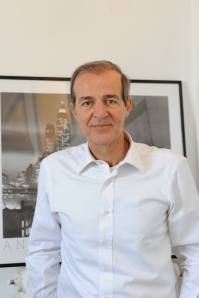The Intel: Roberto Costantini
Roberto Costantini’s Commissario Balistreri books are about as far from the cosy Montalbano as you can get. Introduced in the international bestseller The Deliverance Of Evil, Balistreri is a flawed Italian detective searching for redemption.
In the second thriller in Costantini’s trilogy, The Root Of All Evil, the damaged Balistreri searches for the murderer of a student in 1982 on the evening of Italy’s World Cup victory - and the scars of his childhood in Libya are revealed.
Costantini was born in Tripoli in 1952 himself. A former engineer, he now teaches on the MBA program at the Guido Carli University in Rome. Crime Thriller Fella is delighted that he’s agreed to give us the intel on Balistreri and his link to Italy’s troubled past…
How would you describe Commissario Balistreri to a new reader?
In modern thrillers the hero (the detective) is normally a troubled person, but troubled in a way that makes them likeable to the reader. Balistreri is also troubled, but is depicted differently: in the sense that, when we first meet him, he is likely to be unlikable, yet very intriguing, to a large portion of the readership.
Balistreri is a damaged man – and The Root Of All Evil delves into his childhood in Tripoli. What made you set a portion of the novel in Libya?
Libya was chosen for two reasons: because the events of Gaddafi’s rise to power in 1969 are real, and fascinating, but are still not widely documented; and because Libya is a perfect example of a place wherein the values of the old world (loyalty and trust) were replaced in favour of the values of the new world (making a lot of money very quickly).
Is it true to say that Balistreri perhaps represents Italy’s troubled past?
Balistreri is an ex-fascist. His vision of fascism before the alliance with Hitler is positive. This opinion was (and is) shared by a large portion of Italians, even today. It is a minority view, but not a minor one, and needs to be understood in order to fight properly against modern Fascism.
How important is it to you that crime fiction has something to say about the society you live in?
It is not fundamental. While this trilogy is very much anchored to society, my next book will probably be far from that.
Take us through a typical writing day for you?
I work full time in a University. So typical writing days are weekends and holidays. This fact, coupled with the Italian weather, allows me to write on a terrace in front of a beautiful beach or a beautiful mountain. Which makes things much easier.
 What’s the hardest lesson you ever had to learn about writing?
What’s the hardest lesson you ever had to learn about writing?
That at a certain point you need to stop trying to make the book better. After a certain point you can only make it worse. Good writers are not perfectionists.
Who are the authors you admire, and why?
Kundera writes extraordinary ‘thrillers of the soul’ even though no one would classify him as a thriller writer. And Raymond Chandler. With regards to thrillers, my ideal combination would be the plots of Agatha Christie and the characters of Georges Simenon.
What can you tell us about the third novel in the Balistreri trilogy?
That, to put it the Nietzschean way, existence is a circle, everything comes back to the starting point; but in a circle there is no starting point. That the truth about all the killings across the fifty years lies both in time past and time future. Sound mysterious?
***
The Root Of All Evil by Roberto Costantini is out now, published in hardback by Quercus Books.


